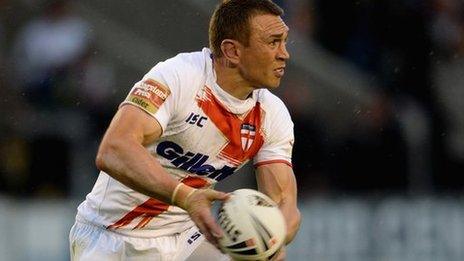Rugby League World Cup 2013: Tournament begins with a bang
- Published
Highlights: Australia 28-20 England
If the organisers of the 2013 Rugby League World Cup could have scripted the opening day of the tournament, it probably wouldn't have been much different to what happened at Cardiff's Millennium Stadium on Saturday.
OK, in their wildest dreams England would have overturned red-hot tournament favourites Australia in front of a sold-out stadium.
But that was always far less likely than the nightmare scenario - the one in which England took a competition-deadening thrashing in a stadium plentiful in empty seats.
Instead, a decent-ish crowd of 45,052 watched two very competitive matches, with Australia battling back from 10-0 down to defeat England 28-20 before Italy overcame co-hosts Wales 32-16 in the second fixture.
All this had been preceded by an opening ceremony that, while far removed from the epic served up at last year's London Olympics, did not lack for pick-and-mix family-friendly variety.
Ballroom dancing from rugby league legends, a harpist, funked-up classical music, Welsh legend Gareth Thomas scoring a 50-yard unopposed try, volunteers in monster suits and hooded tops, a big globe supporting a man on a sort of mini-circular trapeze, 14 large balloons - one for each nation, fireworks (indoor), fire (lots of fire), multi-coloured streamers, glow sticks, face paint - there was a little something for everyone.
For weeks the organisers had been very cagey about the number of tickets sold for this double-header; the fact they were not discussing specific numbers was perhaps a little worrying.
Taking such a crucial fixture, when the casual fan might take a glance and make an instant, snap decision about the tournament, so far away from the game's traditional heartland in the north of England always looked risky.
But fears we might be in for a repeat of the disastrous opening game in 2000,, external when 33,758 watched the Aussies hammer England 22-2 at a wet and unenthusiastic Twickenham, proved unfounded.
Rugby League World Cup highlights: Wales 16-32 Italy
There was a buzz around Cardiff in the morning and a real sense of occasion inside the ground, a sensation heightened by the fact it all took place under the closed roof.
Sure, it would have been great if a few more had turned up and the attendance had hit the 50,000 target the organisers ideally hoped for - but there was plenty to encourage and enthuse people taking a look at the game for the first time.
And it is worth remembering that a fifth of ticket sales in advance of the tournament had been purchased by people with no previous record of attending major rugby league events. In other words, lots of potential new fans will be watching this World Cup.
In a bizarre kind of way it is difficult to imagine how England could have done more to drum up interest in what has been described as the major sporting event taking place on these shores this year.
A warm-up defeat against an Italian side that had just three training sessions together and whose players are not paid to be here but are given £200 living expenses per week certainly grabbed more headlines than the hammering everyone expected.
Then there was the sudden, unexpected decision to throw Gareth Hock out of the squad for breaking an alcohol ban and missing a subsequent training session, followed by the surprise omission of stand-out prop James Graham from the side to face the Aussies.
All this was capped off when coach Steve McNamara walked out of Friday's pre-match news conference after refusing to answer repeated questions about Graham's omission.
It looked like three years of preparation descending into turmoil; it looked like the coach was cracking under the pressure - it gave everyone plenty of headlines. So much so that the Daily Telegraph - a newspaper not known for its wall-to-wall coverage of rugby league - led with a photo of McNamara on the front page of its Saturday sport supplement.
It all seemed to be making a mockery of McNamara's oft-repeated assertion that he is in charge of the best prepared league side to come from England. It all seemed to point towards his team taking a good hiding against a team that had gone quietly about their preparations.
Australia are on their longest tour since 2000. Captain Cameron Smith has put talks about his club future on hold. Centre Greg Inglis has been nursing a knee injury so he can be here. They lost the final in 2008 and the nine-time winners want their trophy back. For many of their great players it will probably be their last chance to win the World Cup.
The Aussies means business - and apart from an incident that saw forward Josh Papalii mugged, external to the tune of £200 on his first night in Manchester, they enjoyed a focused, textbook build-up to Saturday's game.
If they had hammered England it could have easily put a big dampener on the opening day, regardless of how successfully the organisers had put on the event.
Rugby League World Cup: England disappointed with second half
But as Kangaroos coach Tim Sheens stressed afterwards, England were aggressive and skilful. They were up for the fight and outplayed his team in several areas.
England paid for poor discipline and some sloppy handling but they punched enough holes in the Aussies to show they can be a real threat and generate the momentum a major tournament like this needs from its host nation.
Prime Minister David Cameron had tweeted in the hours before the game telling us to look forward to the next five weeks.
And on the same field where the London Olympics began with a slightly underwhelming women's football fixture on 25 July last year, the Rugby League World Cup started with a bang.
It was not one so loud that it deafened anyone who heard it, but enough to suggest that this will be a tournament worth watching.
Watch England's group matches, plus one quarter-final, one semi-final and the final live on BBC TV, online, mobiles and Connected TVs. Listen to every match live on BBC Radio 5 or 5 live sports extra
- Published26 October 2013
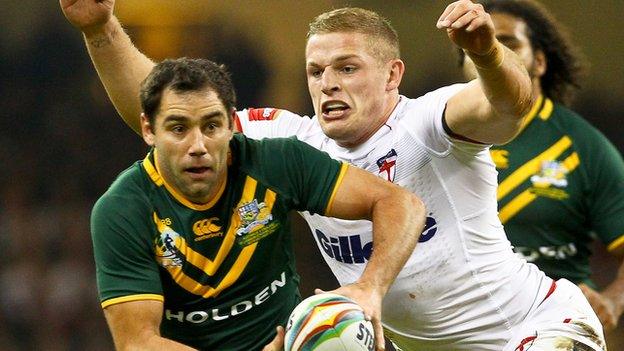
- Published26 October 2013
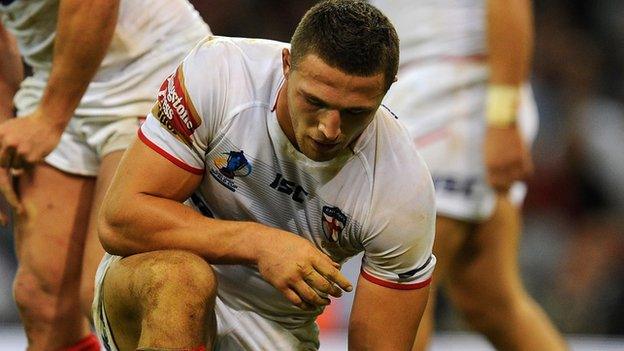
- Published26 October 2013
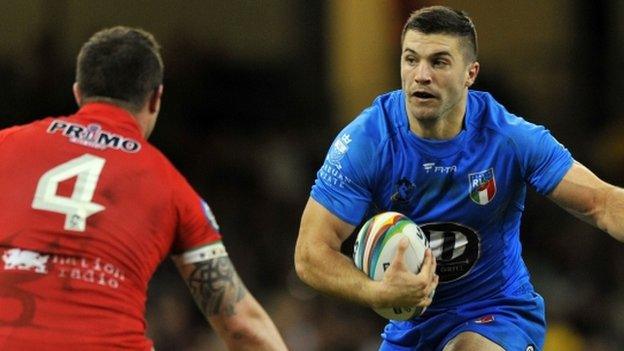
- Attribution
- Published26 October 2013
- Published1 November 2015
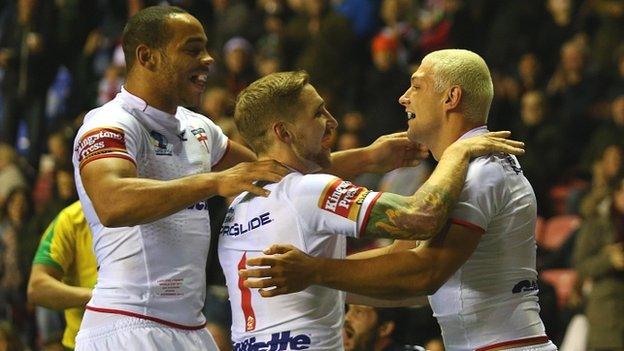
- Published21 May 2019
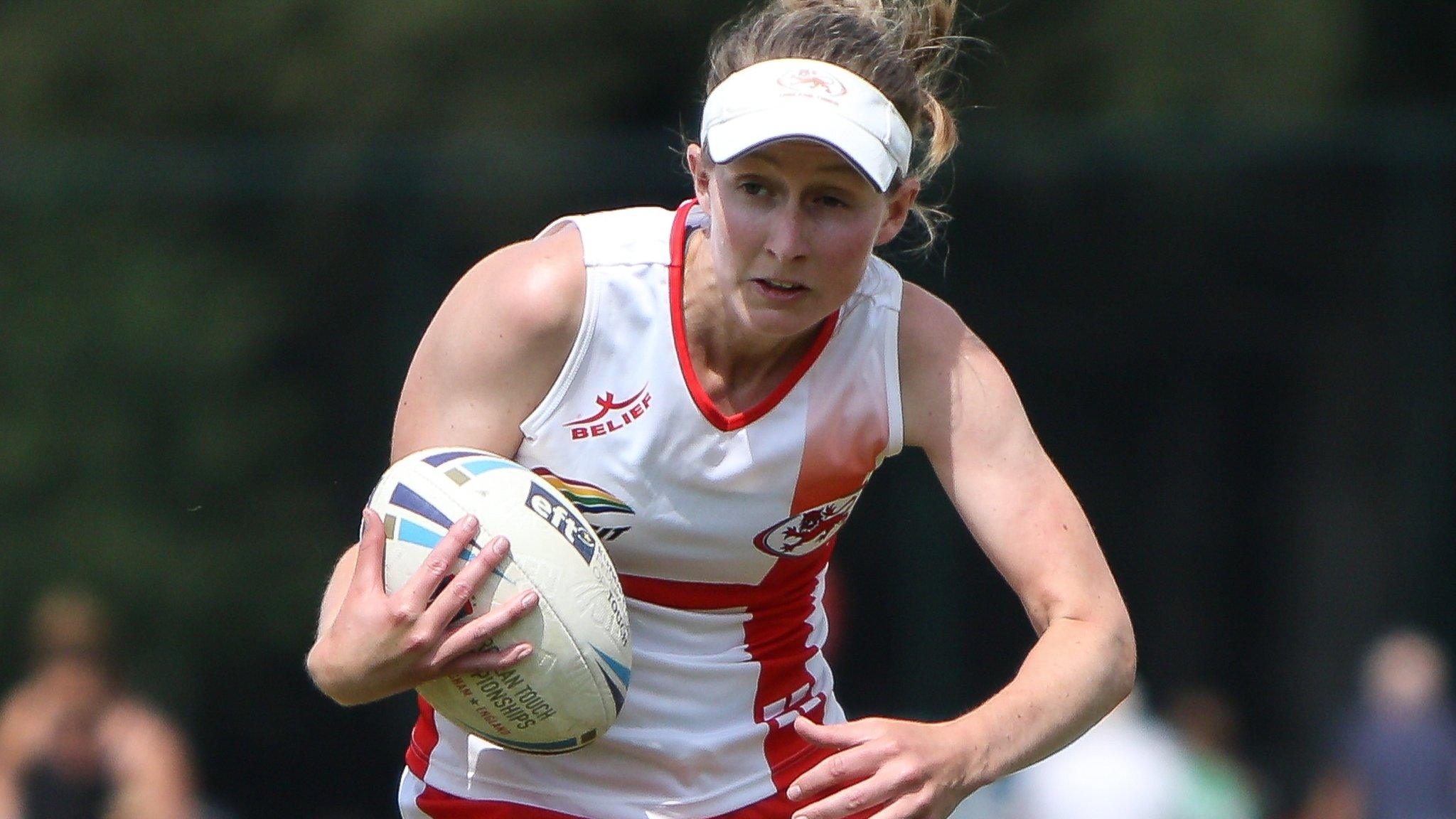
- Published30 November 2013
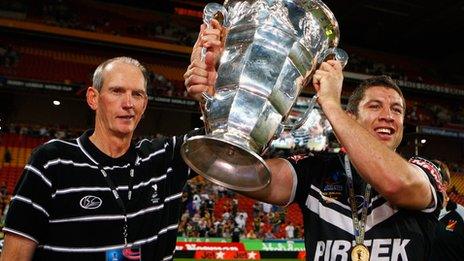
- Published24 October 2013
